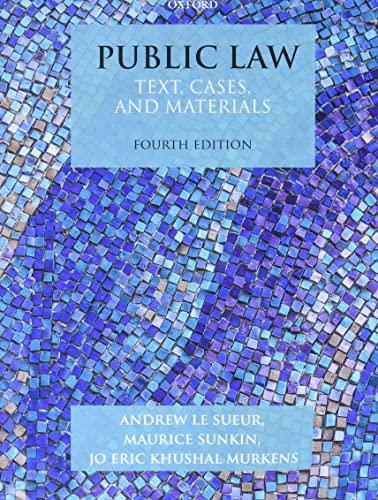Question
The year is 2017 and there has been a recent disturbing proliferation of hate speech directed against various ethnic groups, often using talk radio shows
The year is 2017 and there has been a recent disturbing proliferation of hate speech directed against various ethnic groups, often using talk radio shows as a medium. To counteract this trend, Congress passes a law granting the Federal Communications Commission (FCC) the authority to make rules to ensure that hate speech is kept off of the airwaves.
Pursuant to this authority, the FCC passes a regulation that states:
Any radio station having been found to have allowed to be broadcast over its airwaves speech that is intended to incite hatred or violence against any group of people at least three (3) times during any given three-month period shall be subject to sanctions, up to and including revocation of its license to broadcast, that the Commission deems appropriate.
KHAT, a radio station in Kansas City, Missouri, is accused under this rule. According to FCC administrators, the host of a KHAT afternoon show, on at least seven separate occasions between October and December of 2017, made extremely derogatory remarks about gay people, including statements calling for all gay people to be exiled from the United States and encouraging listeners to actively discriminate against them in housing and employment and to physically attack gay people where possible.
After an administrative hearing, an FCC panel suspends the broadcast license of the station. KHAT sues in federal court, seeking an injunction against the enforcement of this suspension. KHAT claims that its broadcasts at issue are free speech, protected under the First Amendment to the United States Constitution and that the FCC therefore may not take any action against them because of these broadcasts.
Is KHAT correct or may the FCC suspend its license?
Because this is a federal constitutional issue, you may use any federal case law to answer this question. Of course, U.S. Supreme Court cases are best, but lower federal cases may also certainly be used, especially if they are more on point. What are the relevant facts according to the constitution? How do you apply them to our case?
Step by Step Solution
There are 3 Steps involved in it
Step: 1

Get Instant Access to Expert-Tailored Solutions
See step-by-step solutions with expert insights and AI powered tools for academic success
Step: 2

Step: 3

Ace Your Homework with AI
Get the answers you need in no time with our AI-driven, step-by-step assistance
Get Started


